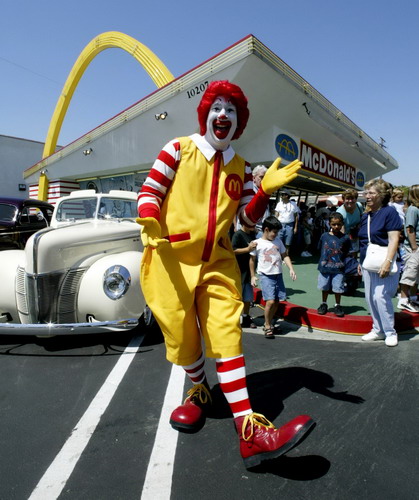Society
US pediatrician group urges ban on junk food ads
Updated: 2011-06-28 11:08
(Agencies)
|
 A Ronald McDonald character poses at the world's oldest operating McDonald's restaurant, with the original golden arch architecture, as it draws a crowd on its 50th anniversary in Downey, California in this August 18, 2003, file photo. McDonald's Corp spurned calls to assess the impact of its food on childhood obesity, and said its trademark clown Ronald McDonald would be hawking Happy Meals to kids for years to come. [Photo/Agencies]
|
|
||||
More than one in six children and teenagers in the United States are obese - up three-fold from a generation ago, according to the US Centers for Disease Control and Prevention.
"Thirty years ago, the federal government ruled that young children are psychologically defenseless against advertising. Now, kids see 5,000 to 10,000 food ads per year, most of them for junk food and fast food," Strasburger said.
The AAP's statement comes as public health officials, lawmakers and parents are becoming increasingly frustrated with rising childhood obesity rates and weak anti-obesity efforts from restaurant operators and food and beverage companies.
"There is massive marketing of the worst foods, even to children under age 5. It is toxic and until it stops there is little hope of dealing with obesity," said Kelly Brownell, director of Yale University's Rudd Center for Food Policy and Obesity.
Small, public steps
US spending on food marketing aimed at children aged 2 through 17 via television, the Internet, video games, text messages and other means may come to $1.6 billion a year, the Institute of Medicine said in a report last week.
In an earlier report, "Food Marketing to Children and Youth," the institute concluded that there is strong evidence that exposure to TV advertising is associated with weight gain in children 2 to 11 years.
US food industry groups - which say they have reduced direct marketing to children and put voluntary guidelines around the practice - found fault with the AAP's statement.
The Grocery Manufacturers Association said it was based largely on outdated research that does not adequately reflect the marketplace and trends.
"It's an ineffective approach to blame childhood obesity on advertising, when the report points to multiple factors, including sedentary behavior, inadequate amount of sleep and increased screen time," said Joy Dubost, director of nutrition for the National Restaurant Association.
Strasburger, who underscored that the AAP statement was based on recent research, agreed that the solution to obesity is complex, and was not surprised by the food industry's response.
"In every public health crisis we've had - whether it's smoking or drinking or obesity -- the industry involved blames the individual, the parent or the consumer," he said.
In addition to promoting better eating habits, AAP and other health experts urge parents to limit the time children spend watching TV, using computers or playing video games because they can lead to inactivity and disturbed sleep.
Public health advocates also are using the courts and local laws to force the food industry to change its practices.
Late last year, the Center for Science in the Public Interest sued McDonald's Corp to stop the world's biggest restaurant chain from giving away free toys with its Happy Meals to lure children into its restaurants.
Lawmakers in San Francisco and nearby Santa Clara County have passed laws that will require kids' meals to meet certain nutritional standards before they can be sold with toys.
McDonald's declined comment.

Specials

Premier Wen's European Visit
Premier Wen visits Hungary, Britain and Germany June 24-28.

My China story
Foreign readers are invited to share your China stories.

Singing up a revolution
Welshman makes a good living with songs that recall the fervor of China's New Beginning.
